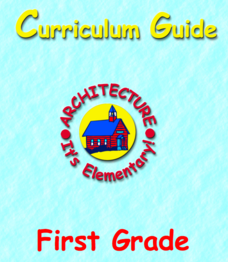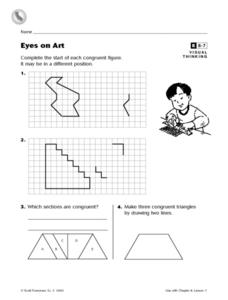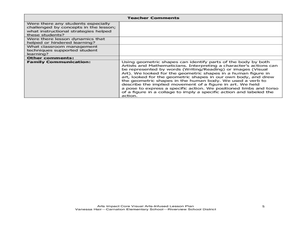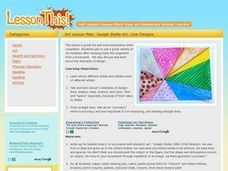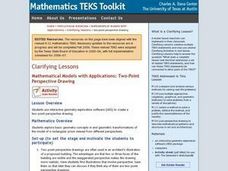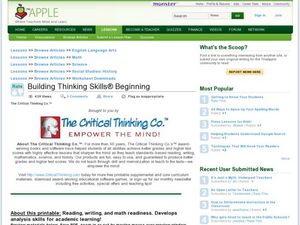American Institute of Architects
Architecture: It's Elementary!—First Grade
Build an interest and appreciation for architecture in your young learners with this fun 10-lesson art unit. Engaging children in using their five senses, the class first observes the environment around them, paying...
MENSA Education & Research Foundation
Shapes - Kindergarten
Extend scholars' learning experience with a unit consisting of five shape lesson plans, an extension activity, assessment, and rubric. Begin by reading a story about shapes, then conduct an overview and assign pupils' their first...
Curated OER
Eyes on Art
In this geometry worksheet, students examine 2 geometric figure drawn on a grid and then draw congruent figures. Next, students answer 1 fill in the blank question where they look at a figure and determine which sections are congruent. ...
Curated OER
Creating 3-D Shapes in Art
By learning techniques for drawing 3-D shapes, students can create realistic drawings.
Curated OER
Scaling Down Art
Students change the scale of a work of art using ratios, percentages, and proportions. While this is technically an art lesson, there is quite a bit of mathematics involved in converting to the correct scale.
Curated OER
Arts Impact and Math
Third graders incorporate math into dancing. In this algebra lesson, 3rd graders identify different shapes and patterns using dance movements. They relate the different creations to polygons as they incorporate the use of stretchy bands...
American Farm Bureau Foundation for Agriculture
Shapes in Agriculture
It's time to get crafty with shapes! Your future farmers demonstrate their geometric ability by building a farm using triangles, circles, rectangles, and squares. But first, scholars take part in a brainstorm session inspired by their...
Curated OER
Refrigerator to Renoir: Ten Great Art Lessons on the Net
Every learner can be an artist with a series of activities designed to access their creativity. With reference links and instructional ideas, this art resource is sure to enrich your class and bring new ideas to even your most reluctant...
Curated OER
Bodies In Motion: Shapes and Gestures
Students use geometric shapes to describe body parts. In this geometry lesson, students use geometry vocabulary as they discuss body parts. They practice drawing bodies using shapes based on a wooden model that is poised to show specific...
Curated OER
Joseph Stella Art: Line Designs
Students discover the focal point in pictures and create their own images using lines and space. In this art analysis lesson, students create a black dot on a white paper which becomes a focal point for the lines the student will...
Curated OER
Navajo Rug
Students explore geometry in Navajo rugs. For this shape art lesson, students create a Navajo rug design using triangles and squares. Students investigate designs on the Internet and then create an original design.
Curated OER
Mathematical Models with Applications: Two-Point Perspective Drawing
Students use interactive geometry exploration software (GES) to create a two-point perspective drawing. They explore basic geometry concepts in and geometric transformations of the model of a rectangular prism viewed from different...
Curated OER
Angles Everywhere
First graders find angles in their classroom. In this geometric figures lesson, 1st graders identify, describe and classify angles they see in their world. Students create pictures that contain angles and display them in the room.
Curated OER
Parallel and Perpendicular Lines
Learners study parallel and perpendicular lines. For this parallel and perpendicular lesson, pupils explore 2-D shapes and determine if the sides are parallel or perpendicular.
Curated OER
Picture Fists Full of Kisses
Ease children's back-to-school jitters with this primary grade lesson based on the book The Kissing Hand by Ruth E. Harper. Starting off with a singing of the song "I Wish I Had a Little Red Box", children go on to discuss and...
Curated OER
Navajo Rug
Navajo art incorporates many fascinating shapes and designs. In this shapes lesson, students explore how shapes may be combined to create art and architecture. They also discover shapes in the world around them.
Berkshire Museum
Adopt a Schoolyard Tree
Help young scientists connect with nature and learn about trees with a fun life science lesson. Heading out into the school yard, children choose a tree to adopt, taking measurements, writing descriptions, and drawing sketches of it in...
Curated OER
Ornithology and Real World Science
Double click that mouse because you just found an amazing lesson plan! This cross-curricular Ornithology lesson plan incorporates literature, writing, reading informational text, data collection, scientific inquiry, Internet research,...
Curated OER
Thinking Skills: Connecting shapes
In this thinking skills worksheet, students draw a line connecting each blue figure without touching any other color. Students connect 4 figures.
Curated OER
Shape Hunt
Young scholars explore two-dimensional and solid shapes. In this shapes and patterns geometry lesson, students work with a partner to create identifiable objects using tangrams. Young scholars describe the attributes of their shape and...
Curated OER
GPS Art
Students design their own logo or picture and use a handheld GPS receiver to map it out. They write out a word or graphic on a field or playground, walk the path, and log GPS data. The results display their "art" on their GPS receiver...
Curated OER
Congruent Polygons: Copying Stretchy Shapes
Third graders investigate congruent polygons through dance. In this congruency lesson plan, 3rd graders do the "brain dance" as a warm up. They review polygon names by singing "The Polygon Chant," before mirroring congruent shapes with a...
Curated OER
Geometric Abstraction
Students create an abstract work of art that is made by repeating geometric shapes and lines, write concise instructions to reproduce the work of art and reproduce someone else's artwork via written instructions.
Curated OER
2-D and 3-D Presents at Pedro's Party
Fifth graders draw 2-D and 3-D shapes. They sketch and label geometric figures with correct terminology, then explore parallel and perpendicular lines. Pupils sort and classify shapes drawn.
